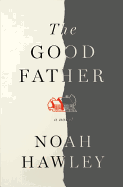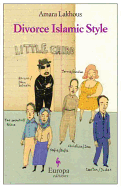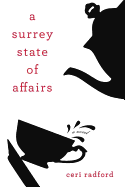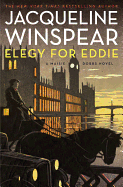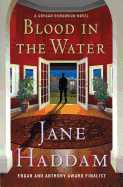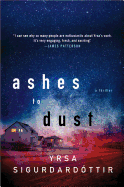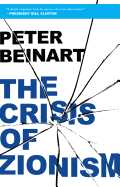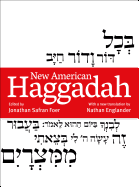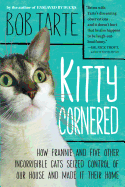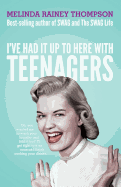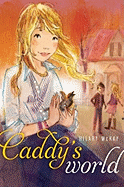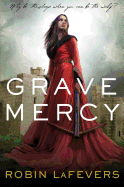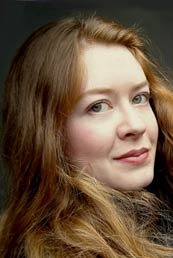 In Grace McCleen's debut novel, The Land of Decoration (Holt), 10-year-old Judith McPherson lives an isolated life. To fill the void she creates a world of her own, the Land of Decoration, constructed with bits and pieces of rubbish and other discarded treasures she finds. Judith takes on the role of God in her microcosm and soon learns there are unforeseen consequences to every action, no matter how good that action initially seems.
In Grace McCleen's debut novel, The Land of Decoration (Holt), 10-year-old Judith McPherson lives an isolated life. To fill the void she creates a world of her own, the Land of Decoration, constructed with bits and pieces of rubbish and other discarded treasures she finds. Judith takes on the role of God in her microcosm and soon learns there are unforeseen consequences to every action, no matter how good that action initially seems.
McCleen was born in Wales and grew up in a fundamentalist religion where she did not have much contact with nonbelievers. Her family moved to Ireland when she was 10, where she was schooled at home. When Grace and her family moved back to Britain she studied English Literature at Oxford University and the University of York before becoming a full-time writer and musician. She lives in London.
You began writing this novel during a period of illness--was this the first opportunity you had to take the leap?
I'd always wanted to write a novel; I wanted it so much in fact I might never have got around to it (as is often the case with the most consuming ambitions) unless I had been laid up ill and not able to do much else. It wasn't the first opportunity; I could have made time before but I was so terrified of beginning and wanted it to be astonishing and enduring, so I didn't.
How was taking that first step in reality as compared to the fears in your mind?
I was able to overcome the terror because I realized that this was life forcing me to do what I would otherwise always run away from. Taking the step was just as awful as I had imagined and nearly every sentence I wanted to stop. It was a sort of agony. I'd rather go through extreme physical pain than do it again.
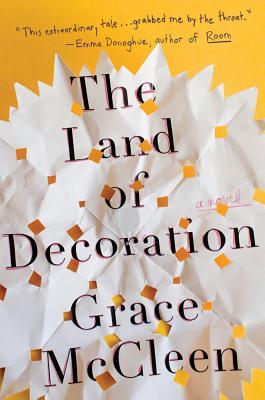 Based on your life story, The Land of Decoration seems to have an autobiographical feel to it. How close are Judith's experiences to your own?
Based on your life story, The Land of Decoration seems to have an autobiographical feel to it. How close are Judith's experiences to your own?
Not very close at all, if you are talking about particular instances or events, but the emotions are very similar--emotions such as grief, fear, rage, etc. I was also extremely isolated and create worlds.
Like Judith, you create "little people." Judith's are creatively fashioned from rubbish but yours are more expertly crafted. What started the fascination with these little people? How did creating worlds become a coping mechanism for you?
Why I began making the little people I have no idea; six months down the line it has become an obsession, I was waking to make more at night, waking up in a sweat, trying to finish them, having panic attacks. Every project is that way for me. I suppose I would have always made the little people at some point, I love tiny things and so it was inevitable.
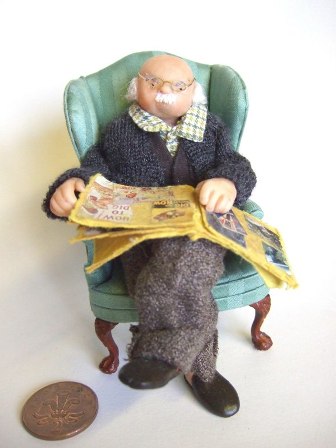 I don't know how much making other "worlds" helped me cope but I did it--do it--continually, so I guess my subconscious thinks it serves some purpose; I find it pretty difficult interacting in the real world, I suppose.
I don't know how much making other "worlds" helped me cope but I did it--do it--continually, so I guess my subconscious thinks it serves some purpose; I find it pretty difficult interacting in the real world, I suppose.
You've also written songs. If you were to give Judith a theme song, what would it be?
An unusual question--I don't think any of my songs on my website suit her but the childlike sound of "The Boat of Sound" would work well, as would the subject matter of "Holy Smoke," which is all about faith.
Growing up, what kind of experiences did you have reading?
I read mostly children's picture books until I was 16, which are still one of my favourite types of literature, and I wanted to write one and illustrate it for many years. The atmosphere in my favourite children's picture books is still unsurpassed by anything else I have read, probably because in childhood we are so much more susceptible to impressions. I also read the Bible and was very well versed in it as a religious text. But when I began writing The Land of Decoration, I saw that I had imbibed just as much from it in a literary way.
When I was 15, I began reading literature and haven't stopped since. I read literature at Oxford and afterwards did an MA by research at York University.
Do you have authors you especially favor or specific types of books?
The Brontes, Herman Melville, Woolf, Cormac McCarthy, Marilynne Robinson, J.M. Coetzee, Franz Kafka, W.G. Sebald. Books that attempt to express the spiritual experience we humans have in the world--not religious experience; it could be the experience of being in love, the experience of drinking a cup of tea, the experience of picking up excrement from a pavement, the experience of breaking apart. All these writers are also masters of metaphor; metaphor becomes the guiding principle in their work, pointing to something higher than us, something transcendent. They all go as deeply into the darkness of the soul as they can, they deal with extremes (Robinson in the subtlest way of all), and some of them come back. (I don't think Kafka and Sebald do; Robinson definitely does; Melville--well, seeing as he is the god of gods, it's anyone's guess).
You hit a pretty significant depth of darkness in The Land of Decoration--and in your own personal faith as well, it seems--how difficult did you find it to come back?
That's a good question. I haven't come back at all. It is a particularly dark time of my life at the moment.
We truly hope the publication of The Land of Decoration can bring some light to your life. It's a stunning work. What, if anything, do you hope people can take away from the experience of reading your novel?
Thank you so much for your kind words. If people take anything away from it, I hope it is to ask questions: How closely related are belief and imagination? Can we ever take any action that will not affect us in turn? Can the bravest thing in the world be to open ourselves up to love and to confess it? And lastly I hope they stop a moment to digest the short metaphysical passages in between some of the chapters, in which all the dichotomies of life as we know it are explored. Inside and out, something and nothing, energy and matter, space and time, darkness and light--basically all the marvels of our universe, which are very moving when you think deeply about them, and to some people point to some higher power, some beauty, some order, some majesty at work. They draw on the spiritual writers I was reading when I was ill because I was desperately looking for something other than this world, writers like Einstein and Emmanuel Swedenborg and William Blake and Emily Dickinson and Dame Julian of Norwich and Walt Whitman.
What's next for you?
What's next for me is to finish writing my next book, and then music, performing it. --Jen Forbus of Jen's Book Thoughts
Grace McCleen: Darkness and Light
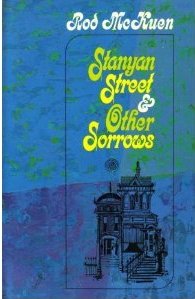 My third choice, Stanyan Street and Other Sorrows, turned out to be more problematic. At the time, Rod McKuen was the best selling and--though I didn't know it until I was caught in deadly academic crossfire--least respected poet in the U.S.
My third choice, Stanyan Street and Other Sorrows, turned out to be more problematic. At the time, Rod McKuen was the best selling and--though I didn't know it until I was caught in deadly academic crossfire--least respected poet in the U.S. 


 In
In  Based on your life story, The Land of Decoration seems to have an autobiographical feel to it. How close are Judith's experiences to your own?
Based on your life story, The Land of Decoration seems to have an autobiographical feel to it. How close are Judith's experiences to your own? I don't know how much making other "worlds" helped me cope but I did it--do it--continually, so I guess my subconscious thinks it serves some purpose; I find it pretty difficult interacting in the real world, I suppose.
I don't know how much making other "worlds" helped me cope but I did it--do it--continually, so I guess my subconscious thinks it serves some purpose; I find it pretty difficult interacting in the real world, I suppose. Remember when you were small and stuck at family gatherings, parked next to dear old Uncle Frank, hearing for the umpteenth time his story of how he blew out all the tires on Grandfather's car?
Remember when you were small and stuck at family gatherings, parked next to dear old Uncle Frank, hearing for the umpteenth time his story of how he blew out all the tires on Grandfather's car?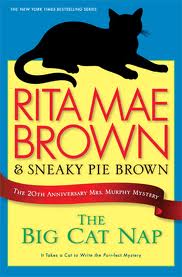 The reward for all this is I laugh when I write; sometimes the smoke comes out of my ears, and sometimes I cry. I love the English language, so I generally have a wonderful time. The other reward and one I never considered when I started writing in high school was that many people hear an echo in my books, whether it is the series or the stand-alone books (e.g., Rubyfruit Jungle and The Sand Castle).
The reward for all this is I laugh when I write; sometimes the smoke comes out of my ears, and sometimes I cry. I love the English language, so I generally have a wonderful time. The other reward and one I never considered when I started writing in high school was that many people hear an echo in my books, whether it is the series or the stand-alone books (e.g., Rubyfruit Jungle and The Sand Castle).